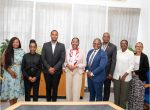By Frans Koita
As Namibia prepares for its upcoming presidential election in November 2024, the next leader will face a complex set of economic challenges that require strategic and decisive action. The country’s real GDP growth is projected to slow to 3.6% in 2024, down from 4.5% in 2023, largely due to global macroeconomic challenges and tight monetary conditions. High unemployment, particularly among the youth, remains a significant concern, with the unemployment rate exceeding 30% and youth unemployment reaching around 46%. Approximately 27% of the population lives below the national poverty line.
Namibia’s total debt has surged to 68% of GDP as of June 2024, significantly exceeding the government’s target of 35%, raising concerns about fiscal sustainability. The current account deficit was approximately 9.8% of GDP in 2021, indicating a persistent imbalance between imports and exports. Inflation rates have hovered around 4.6% as of June 2024, affecting purchasing power and living standards, while the Bank of Namibia has maintained a conservative monetary policy, with interest rates rising to combat inflation.
Ongoing debates regarding land reform have created uncertainty among investors, with land restitution issues impacting agricultural productivity and investment. The budget deficit is projected to widen from 2.9% of GDP in the 2023/2024 fiscal year to 3.1% in 2024/2025, driven by increased expenditures ahead of elections. Corruption in Namibia is perceived as a significant barrier to economic growth, with the current Transparency International report ranking Namibia 59th out of 180 countries in its Corruption Perceptions Index.
To address these challenges, the next president should consider implementing a multi-faceted strategy that focuses on sustainable growth, fiscal responsibility, and social equity. Economic diversification should be a priority, with a focus on promoting non-mining sectors such as agriculture, tourism, and renewable energy. Namibia can leverage its solar energy potential, which is among the highest in the world, to reduce dependency on imported energy.
Fiscal management should involve developing a comprehensive debt management strategy to reduce the national debt, prioritizing essential expenditures, and improving tax collection efficiency, aiming for a 5-15% increase in tax revenue over the next three years while maintaining the planned individual income tax threshold increase from N$50,000 to N$100,000. However, government still needs to address the remaining disposable income amount of these exempted individuals and revamp how certain compulsory fees such as VAT on essential products can be reduced to further increase their spending capabilities.
Transfer costs only being paid from N$1,100,000 and above instead of N$600,000 are steps in the right direction for new home owners. However, government should look at how those who cannot afford completed homes can at least afford plots in urban areas. The private sector working class should equally receive some form of subsidy advantages when purchasing new homes, such as the government employees. Land reform should be addressed transparently by establishing a clear framework that balances restitution with the rights of current landowners, potentially involving community-based land management initiatives.
Inflation control and monetary policy should be a deeper collaborative effort between the government and the Bank of Namibia, implementing policies aimed at controlling inflation while considering monetary easing as economic conditions improve. The investment climate can be improved by streamlining regulations, simplifying administrative processes for businesses, and aiming to improve Namibia’s ranking in the World Bank’s Ease of Doing Business Index, currently at 104th. Small businesses should be given more attention in terms of operations, funding abilities and expansion capabilities. The boarder gates on tarrifs and custom duties with African countries should be opened, allowing for local businesses to market their product across boarders where more spending power is available, thus contributing to a more favorable Balance of Payment result by promoting local products outside of Namibia and making the most out of the AfCFTA agreement which was implemented in early 2021.
Other proposed solutions include removing collateral requirements for youth seeking debt financing to increase youth entrepreneurship by the same amount of youth unemployment of 46%; implementing a policy requiring police officers to wear body cameras to enhance accountability and public trust; potentially reducing police misconduct by 70%, implementing CCTV cameras on street poles at robbery hotspots, and building dual-carriage highways on roads with high accident rates.
By addressing these challenges and implementing the proposed solutions, the next president of Namibia can create a more resilient and prosperous economy that benefits all citizens. Engaging stakeholders across sectors and maintaining a long-term vision will be crucial for the successful implementation of these strategies.
Frans Koita is the Founder of DKL Africa Business Consultations










